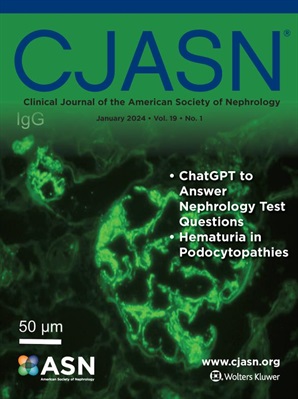Culinary Medicine for Chronic Kidney Disease.
IF 8.5
1区 医学
Q1 UROLOGY & NEPHROLOGY
Clinical Journal of the American Society of Nephrology
Pub Date : 2025-06-17
DOI:10.2215/cjn.0000000785
引用次数: 0
Abstract
Culinary medicine is an emerging, evidence-based discipline that integrates medical and nutritional care with practical culinary strategies to mitigate the risk and progression of chronic kidney disease (CKD). Culinary Medicine, which falls under the broader movement of "Food is Medicine", supports culturally relevant, person-centered health care goals. It addresses strategies to overcome the health risks of the standard American diet, high in animal protein, salt, sugar, and ultra-processed foods. Recent guidelines, including the Kidney Disease Outcomes Quality Initiative (KDOQI) Clinical Practice Guidelines for Nutrition in CKD 2020 and Kidney Disease Improving Global Outcomes (KDIGO) 2024 Clinical Practice Guideline for Evaluation and Management of CKD (40), recommend adoption of plant-rich eating patterns, based on the large body of evidence highlighting benefits such as reduced net acid production, lower body weight, and improved blood pressure. Transition to a kidney-friendly eating pattern is often hindered by barriers, like time, budget, and culinary skill. This innovative field uses food as a preventive and therapeutic tool to overcome barriers to the actionable food choices needed for better health. This article aims to: (1) underscore the role of culinary medicine in lifestyle intervention to improve CKD outcomes; and (2) explore practical implementation of Culinary Medicine in CKD management to optimize patient well-being. While direct, large-scale clinical trials specifically on culinary medicine in CKD are still emerging, the synergy of nutritional evidence and experiential strategies points to its promise as a preventive and therapeutic tool for improving CKD outcomes. Increasing awareness of the existence and effectiveness of culinary medicine within the nephrology community can foster meaningful discussions about impactful lifestyle changes that influence patient outcomes.慢性肾脏疾病的烹饪药物。
烹饪医学是一门新兴的、以证据为基础的学科,它将医学和营养护理与实用的烹饪策略结合起来,以减轻慢性肾脏疾病(CKD)的风险和进展。烹饪医学属于更广泛的“食物即医学”运动,它支持与文化相关的、以人为本的保健目标。它提出了克服标准美国饮食中动物蛋白、盐、糖和超加工食品的健康风险的策略。最近的指南,包括肾病结局质量倡议(KDOQI)《2020年CKD营养临床实践指南》和肾病改善全球结局(KDIGO) 2024年CKD评估和管理临床实践指南(40),建议采用富含植物的饮食模式,基于大量证据,强调了减少净酸产生、降低体重和改善血压等益处。向肾脏友好型饮食模式的转变经常受到时间、预算和烹饪技巧等障碍的阻碍。这一创新领域利用食物作为预防和治疗工具,克服了为增进健康而选择可行食物的障碍。本文旨在:(1)强调饮食医学在生活方式干预中改善CKD结局的作用;(2)探索烹饪医学在CKD管理中的实际应用,以优化患者的福祉。虽然直接,大规模的临床试验,特别是烹饪药物在慢性肾病中仍在兴起,营养证据和经验策略的协同作用指出,它有望作为一种预防和治疗工具,改善慢性肾病的结果。在肾脏病学界提高对烹饪医学的存在和有效性的认识,可以促进有关影响患者预后的生活方式改变的有意义的讨论。
本文章由计算机程序翻译,如有差异,请以英文原文为准。
求助全文
约1分钟内获得全文
求助全文
来源期刊
CiteScore
12.20
自引率
3.10%
发文量
514
审稿时长
3-6 weeks
期刊介绍:
The Clinical Journal of the American Society of Nephrology strives to establish itself as the foremost authority in communicating and influencing advances in clinical nephrology by (1) swiftly and effectively disseminating pivotal developments in clinical and translational research in nephrology, encompassing innovations in research methods and care delivery; (2) providing context for these advances in relation to future research directions and patient care; and (3) becoming a key voice on issues with potential implications for the clinical practice of nephrology, particularly within the United States. Original manuscript topics cover a range of areas, including Acid/Base and Electrolyte Disorders, Acute Kidney Injury and ICU Nephrology, Chronic Kidney Disease, Clinical Nephrology, Cystic Kidney Disease, Diabetes and the Kidney, Genetics, Geriatric and Palliative Nephrology, Glomerular and Tubulointerstitial Diseases, Hypertension, Maintenance Dialysis, Mineral Metabolism, Nephrolithiasis, and Transplantation.

 求助内容:
求助内容: 应助结果提醒方式:
应助结果提醒方式:


